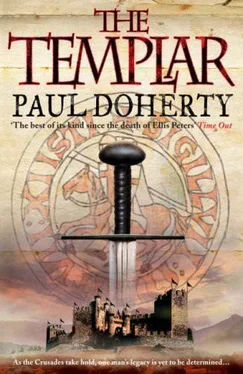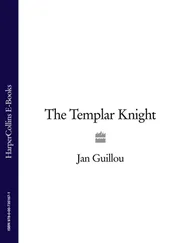P. Doherty - The Templar
Здесь есть возможность читать онлайн «P. Doherty - The Templar» весь текст электронной книги совершенно бесплатно (целиком полную версию без сокращений). В некоторых случаях можно слушать аудио, скачать через торрент в формате fb2 и присутствует краткое содержание. Год выпуска: 2010, ISBN: 2010, Издательство: Minotaur Books, Жанр: Исторические приключения, на английском языке. Описание произведения, (предисловие) а так же отзывы посетителей доступны на портале библиотеки ЛибКат.
- Название:The Templar
- Автор:
- Издательство:Minotaur Books
- Жанр:
- Год:2010
- ISBN:9780312576837
- Рейтинг книги:5 / 5. Голосов: 1
-
Избранное:Добавить в избранное
- Отзывы:
-
Ваша оценка:
- 100
- 1
- 2
- 3
- 4
- 5
The Templar: краткое содержание, описание и аннотация
Предлагаем к чтению аннотацию, описание, краткое содержание или предисловие (зависит от того, что написал сам автор книги «The Templar»). Если вы не нашли необходимую информацию о книге — напишите в комментариях, мы постараемся отыскать её.
The Templar — читать онлайн бесплатно полную книгу (весь текст) целиком
Ниже представлен текст книги, разбитый по страницам. Система сохранения места последней прочитанной страницы, позволяет с удобством читать онлайн бесплатно книгу «The Templar», без необходимости каждый раз заново искать на чём Вы остановились. Поставьте закладку, и сможете в любой момент перейти на страницу, на которой закончили чтение.
Интервал:
Закладка:
Better still, they argued in taverns and alehouses, life would improve. They would be liberated from tilling the harsh fields in endless, grinding monotony. The journey to Jerusalem was an escape not only from evil-smelling dark alleyways and damp hovels but from the strictures of life. Women dressed in men’s clothing and flourished spears with warlike threats. Priests, caught up in the frenzy, assumed the cross without consulting their bishops. Monks emerged from monasteries; some of them had not seen outside life since their youth and yet their abbots could not restrain them. Those who engaged in the sacred cause were, by papal decree, exempt from all taxation and relieved from duties if their lord did not take the cross. Debtors could not be held to account as long as they were a cross-bearer. No legal suit could be started against one who wore the sacred sign, whilst the cross was protection against almost any criminal action. Prisoners were released on the understanding that they would fight the Turks. Robbers who had been a terror to their neighbourhood for years were received into the peace with open arms. No man was so sin-laden that he could not be purged by merely assuming the cross and carrying out his vow. Women urged husbands, lovers and sons to enlist in the sacred cause. The man who held back was looked upon as a traitor to Christ and a coward to his community. Women’s garments were sent to him. Men and women burned and cut the sign of the cross on their own bodies and even branded their children, including infants at the breast, with the all-important symbol. A priest appeared with a cross burned deep on his forehead and confirmed it had been accorded to him by heaven.
Nowhere did the word of God move so deeply as in the village of St Nectaire, close to Clermont where Urban had preached. It was a wild countryside dotted with extinct volcanoes now covered by craters full of wild flowers and grassy clumps, its limestone gorges washed by turbulent streams. A landscape of contrasting colours like the different shades of dark on a pigeon’s wing. The hymn to the Crusade had blown strong and clear here. The tensions of life would be released, all dissolved in the glorious journey to Jerusalem, which according to some was only five hundred miles away, or was it five thousand?
On the eve of the Feast of St Ignatius of Antioch, the Year of Our Lord’s Incarnation 1096, the people of the manor of St Nectaire met in the chilly nave of their parish church. All assembled. Folk memory, as well as the records of the time, clearly establishes that, as does the chronicle written by Eleanor de Payens. They took the oath. They prostrated themselves on the freezing-cold floor of that haunted, sombre nave so recently polluted by spilt blood, its sanctuary violated as the witch Anstritha had been dragged out screaming to be hanged above a roaring fire. Those who had witnessed that, even participated in such a violent act, now tried to forget it as they concentrated on their own secret sins reeking of evil, their souls full of an insatiable hunger for absolution. The villagers of St Nectaire took the cross, the staff and the wallet. Jerusalem beckoned. They would exult when their feet trod the sacred streets behind its holy walls and heaven-built gates. Satan would be no more. The Lord of Hosts would encamp with them. They chanted the lines of the psalm:
One thing I have asked of the Lord,
For this, I long.
To live in the house of the Lord all the days of my life.
To savour the sweetness of the Lord.
And behold His Holy Temple…
Once this finished in a resounding ‘Amen’, Father Alberic asked them, as they sat on the rough benches before the rood screen, to look on the ravaged face of their crucified Christ, reflect on their sins and seek absolution. One by one they were to move across to the shriving pew where Father Alberic, in his dusty black gown, sat in the mercy chair to listen, exhort and bestow absolution.
The place of penance was in a shadowy transept concealed behind a squat, drum-like pillar. One candle of pure beeswax, a pledge by Hugh de Payens, glowed invitingly; its dancing flame illuminated the vivid wall-painting nearby: a scene from the Apocalypse, Satan’s persecution of the elect, a river of torment that the Lord of Hell vomited against the Church. The widow Eleanor de Payens was the first to cross to this shadowy place of repentance and absolution. She had followed her brother from the green fields of Compiègne on the left bank of the Seine outside Paris: like him she had taken the cross and so must be shriven. Eleanor’s graceful, strong face was shrouded by a veil, her skin unpainted, her bright grey eyes clearly troubled, her full lips slightly parted, firm chin jutting forward. She found confession difficult; she always did. She knelt before the shriving pew, whispered her list of petty sins, then paused, head down.
‘And?’ Father Alberic whispered. There was always an ‘and’.
‘Father, I am a widow. My husband Odo…’ Eleanor paused, ‘he fell one night and killed himself.’
‘I have heard of this.’
‘But not the full truth, Father. He was deep in his cups. I encouraged him in that.’
‘Why?’
‘To keep him from me, but he came searching. At Compiègne,’ Eleanor continued in a rush, ‘in our castle, a tower built of stone with a wooden hall alongside, my chambers lie high in the turret.’ She took a deep breath. ‘He came up, Father. I was alone. His mouth was full of foul oaths, his heart bubbling with malice, his belly swilling with cheap wine. I met him on the stairwell. We fought. I pushed him, Father, he fell, striking his head against the walls, the sharp stone steps…’
‘You were defending yourself?’
‘Father, I was pleased to see him fall.’ Eleanor could say no more. She could not confess those last sins, her secret pleasure at Odo’s death, those long hours she stayed in her chamber, neglectful about what had happened to him.
However, Father Alberic was nodding understandingly, hand already going up, lips mouthing the “Absolvo te”.
Eleanor left the shriving pew. She had leaned so tensely against the mercy chair that her arms and wrists ached. Alberic had said that her penance would be her pilgrimage. She crossed the nave and knelt in the Lady Chapel, staring up at the carved face of the Virgin. Eleanor closed her eyes and once again whispered the Confiteor.
‘I confess to almighty God, and to you my brothers and sisters, that I have sinned exceedingly…’
Would she, Eleanor wondered, gain peace and absolution in Outremer? Would she kneel in the Holy Sepulchre and ask forgiveness? Or would Odo’s angry, hate-filled face, full of fury at his own impotence, come like a shadow of the night to haunt her? No one knew the full truth, not even her beloved brother Hugh, or his close comrade Godefroi of St Omer, to whom she was so attracted. Was that also a sin, her secret thoughts and desires? Little wonder she was determined to journey to Jerusalem. She had brushed aside her brother’s objections, whilst meeting Godefroi of St Omer was only further encouragement to take the cross. Moreover, to stay in that rain-washed manor at Compiègne, alone and vulnerable, waiting for the ghosts to return… Eleanor caught herself and sighed. Her pilgrimage was certainly not for selfless reasons. She chewed her lip and wondered about her brother’s…
At the mercy chair, Hugh de Payens was also seeking absolution, for the drunkenness that followed his wife’s death in childbirth, his consolation with the occasional whore, and above all, his constant absorption with the tourney or the mêlée, his need, even hunger, for a life of fighting. If he could only sweep this up, purify it and place his sword at the feet of the Lord and Holy Mother Church… Father Alberic heard him out. The priest was glad Hugh was their leader. He was an accomplished knight, skilled in war and swordplay, who had purified himself through service in Iberia against the infidels. A fanatic? Alberic wondered. Hugh’s face was lean; his dark eyes, thin lips and slightly hooked nose gave him a rather cruel, predatory look. He was tall and slim, with the long, powerful arms of a swordsman, a soul looking for a song, Alberic concluded as he raised his hand in absolution. Yes, the priest was glad Hugh de Payens was to be the leader of their company as well as an ally in Alberic’s own secret search for the truth.
Читать дальшеИнтервал:
Закладка:
Похожие книги на «The Templar»
Представляем Вашему вниманию похожие книги на «The Templar» списком для выбора. Мы отобрали схожую по названию и смыслу литературу в надежде предоставить читателям больше вариантов отыскать новые, интересные, ещё непрочитанные произведения.
Обсуждение, отзывы о книге «The Templar» и просто собственные мнения читателей. Оставьте ваши комментарии, напишите, что Вы думаете о произведении, его смысле или главных героях. Укажите что конкретно понравилось, а что нет, и почему Вы так считаете.












